Exercises for Unit1 Module4(1)
Module 4 Unit 1 八年级英语下册(外研版)
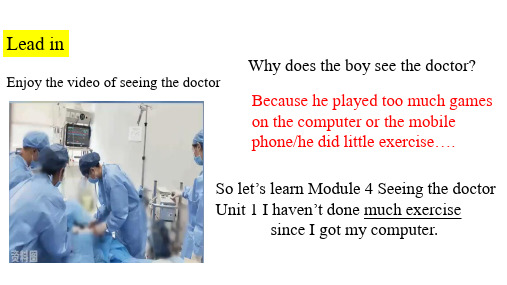
6.take your temperature 量一量你的体温 eg:Have you taken your temperature?你量体温了吗?
take常见的用法:
魔法
典记例忆完成句子。 (1)你最好先量一下他的体温。 You'd better __t_a_k_e___ _h_i_s_____ _te_m__p_e_r_a_tu_r_e__ first. (2)记得饭前吃药。
do more exercise
sleep well
eat more vegetables have more fruit
Language points
1. I feel ill. feel ill 感觉不舒服,感到身体不适。feel是系动词,后常跟形容词作表语,构成
系表结构。ill是形容词,意为“不健康的,生病的”,其比较级和最高级分别为 worse、worst。ill 的名词形式为illness(疾病)。 例:You should go to the doctor if you feel ill. 如果你觉得不舒服,就该去看医生。
【拓展】器官名词后缀-ache表示部位疼痛
tooth+ache = toothache (牙痛) head+ache = headache (头痛) back+ache= backache(背痛) stomach+ache = stomachache(胃痛) ear+ache= earache (耳朵痛) heart+ache= heartache(心痛)
例:That’s why he got angry with me. 那正是他对我生气的原因。
Tom overslept this morning. That is why he was late for work. 汤姆今天早晨睡过头了。 那就是他上班迟到的原因。
Module 4Unit 1 Mum bought a new T-shirt for me. 教学设计

Module 4Unit 1 Mum bought a new T-shirt for me. Teaching contentModule 4 Unit 1Teaching material analysisTo ask,answer and present the things happened in the past, and be able to care about others.Teaching aims1. Be able to master the words and phrases: pair, shorts, argue, matter, took, wear,2. Learn to use: ○1 Sam took my T-shirt. He wants to wear it.○2 Mum bought a new T-shirt for me.○3— Did you wash Lingling’s T-shirt?— No, I didn’t. Lingling’s T-shirt is clean.She didn’t wear it.Teaching key pointsCan use English to ask, answer and present the things happened in the past, and be able to care about others.Teaching difficulties1.To master the past forms of some verbs.2.To make students be able to care about others.Teaching modeLead-in, Learning, Discussion, PracticeTeaching methodsThe first post- teaching, get training in class.Teaching aidsThe multi-media, tape-recorder, picturesTeaching processStep I Lead-in1. Greetings.2. Warming-up.Sing a chant. ( What’s the matter? )Step II Learning & discussion1. Show Self-learning tip I:To be able to understand the text based on the questions.○1 Who are they?○2 What are they doing?○3 Why are they arguing?2. Listen to the video and answer the questions.3. Open the book, listen to the video again and circle the past participlesand the new words.4. Show Self-learning tip II:○1 Learn and review the past participles together:took-take, bought-buy, washed-wash○2 Self-learn the new words in groups:pair, shorts, argue, matter, took, wear,5. Learn and recite the new words together.6. Learn the key sentences:○1 Sam took my T-shirt.He wants to wear it.○2 Mum bought a new T-shirt for me.○3— Did you wash Lingling’s T-shirt?— No, I didn’t. Lingling’s T-shirt is clean.She didn’t wear it.( Boarding )7. Drill the key sentences in different forms.8. Learn the dialogue.○1 Watch the video and recall the dialogue.○2 Self-learn the dialogue in groups, and underline the key sentences.○3 Solve the problems and learn it in details together:○4 Read the dialogue after the tape.○5 Read after the teacher.Step III Practice1. Read the dialogue in pairs.2. Consolidation○1 Practice the dialogue in pairs. ( Activity 4 )○2 Then choose some pairs come to the front and show it out. Homework1. Read the dialogue after class.2. Copy the words and key sentences twice.Boarding designUnit 1 Mum bought a new T-shirt for me.1. Sam took my T-shirt.He wants to wear it.2. Mum bought a new T-shirt for me.3. — Did you wash Lingling’s T-shirt?— No, I didn’t. Lingling’s T-shirt is clean.She didn’t wear it.Module 4Unit 2 What’s the matter with Daming? Teaching contentModule 4 Unit 2Teaching material analysisTo ask,answer and present the things happened in the past, and be able to care about others.Teaching aims1. Be able to master the words and phrases: sports, hey2. Learn to use: — What’s the matter with Daming?— He lost his bag.Teaching key pointsCan use English to ask, answer and present the things happened in the past, and be able to care about others.Teaching difficulties1. To master the past forms of the verbs.2.Learn to use the key sentences.Teaching modeLead-in, Learning, Discussion, PracticeTeaching methodsThe first post- teaching, get training in class.Teaching aidsThe multi-media, tape-recorder, picturesTeaching processStep I Lead-in1. Greetings.2. Briefly review what we’ve learnt last class.Step II Learning & discussion1.Show the picture of Daming to the students and ask :Who is he? What does he look like?2. Show Self-learning tip I :To be able to understand the text based on the question:What happened to him?3. Listen to the video and answer the question.4. Open the book, listen to the video again, circle the past participlesand the new words.5. Show Self-learning tip II:○1 Learn and review the past participles together:lost-lose, found-find, were-are○2 Self-learn the new words in groups: sports, hey6. Learn and recite the new words together.7. Learn the key sentences:— What’s the matter with Daming?— He lost his bag.( Boarding )8. Drill the key sentences in different forms.9. Learn the dialogue.○1 Watch the video and recall the dialogue.○2 Self-learn the dialogue in groups, and underline the key sentences.○3 Solve the problems and learn it in details together.○4 Read the dialogue after the tape.○5 Read after the teacher.Step III Practice1. Read the dialogue in pairs.2. Consolidation○1 Finish the exercises in pairs. ( Activity 3 )○2 Then choose some pairs come to the front and check out the answers. Homework1. Read the text after class.2. Copy the words and key sentences twice.Boarding designUnit 2 What’s the matter with Daming?— What’s the matter with Daming?— He lost his bag.ExercisesTeaching contentExercises of Module 4Teaching aims1. Be able to master the words and phrases: pair, shorts, argue, matter, took, wear, sports, hey2. Learn to use: ○1 Sam took my T-shirt.He wants to wear it.○2 Mum bought a new T-shirt for me.○3— Did you wash Lingling’s T-shirt?— No, I didn’t. Lingling’s T-shirt is clean.She didn’t wear it.○4— What’s the matter with Daming?— He lost his bag.Teaching Key pointCan use English to ask,answer and present the things happened in the past, and be able to care about others.一、根据所给单词,选择合适的汉语意思。
2021-2022学年外研版五年级上册英语Module4 Unit1课件

( A ) 3.sh___ ___ts ( B ) 4.arg___e ( C ) 5.p___ir
A. or B. ar C. er A. n B. u C. w A. h B. e C. a
Exercise
二、圈出合适的词,完成句子。 1. It isn't (my / I) ruler. 2. John wants (wearing / to wear) it. 3. This T-shirt is (Lingling’s / Lingling). 4. Tom (takes / took) the book yesterday. 5. Dad bought a new bike for (me / your).
课文讲解 2.Listen.Read and act out.
Sam:That’s my T-shirt! 萨姆:那是我的T恤衫! Amy:No! It’s my T-shirt. 埃米:不是!它是我的T恤衫。 Ms Smart:Don’t argue! What’s the matter? 斯玛特老师:不要争吵!怎么了?
Grammar
4.That’s OK! 没关系!
此句是常用的礼貌用语,是回应他人道歉时所用的答语。 例句:—I’m sorry, I’m late. 对不起,我迟到了!
—That’s OK. 没关系!
Grammar
5.He wants to wear it.他想要穿它。
固定结构:want to do sth 想要做某事 例句: He wants to play with his sister. 他想要和他的姐姐玩。 知识拓展: want to do sth = would like to do sth想要做某事
新外研版八年级下Module4_unit1分析
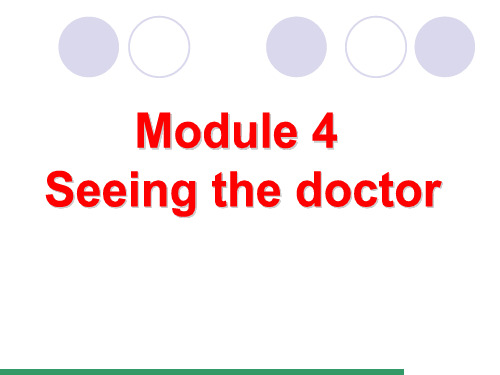
Language points
1. I've got a stomach ache and my head hurts. 我胃痛,头也痛。 注意疾病的表达方式,以“我头痛”为例, 常见的表达方式有: I have got a headache.
Example:
A: How can I help you? B: I’ve got a bad cough A: How do you feel? B: I feel awful. There is a pain in my throat
and it is hard for me to breathe. A: How long have you been like this? B: Since two days ago. A: Well, don’t worry. You should drink more water
=My head hurts/aches. =I have a pain in my head
ache 、sore和hurt 的区别:
ache 是一个名词后缀,如:toothache , headache ,stomachache;
sore 是一个形容词,用来修饰名词,指的是 身体某一部位的酸痛。如:sore back, sore
Daming: OK, so what should I do? Doctor: Well, don’t worry. It’s not serious.
First, stop eating fast food and have breakfast ever day. Second, get some exercise such as running. And I’ll give you some medicine. Take it three times a day. Daming: Thank you, doctor.
外研版八年级英语上Module 4 Unit 1教案与反思
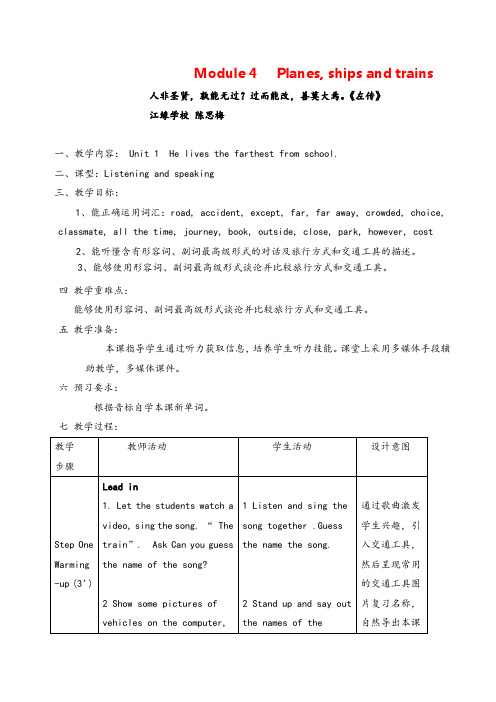
Module 4 Planes, ships and trains人非圣贤,孰能无过?过而能改,善莫大焉。
《左传》江缘学校陈思梅一、教学内容: Unit 1 He lives the farthest from school.二、课型:Listening and speaking三、教学目标:1、能正确运用词汇:road, accident, except, far, far away, crowded, choice, classmate, all the time, journey, book, outside, close, park, however, cost2、能听懂含有形容词、副词最高级形式的对话及旅行方式和交通工具的描述。
3、能够使用形容词、副词最高级形式谈论并比较旅行方式和交通工具。
四教学重难点:能够使用形容词、副词最高级形式谈论并比较旅行方式和交通工具。
五教学准备:本课指导学生通过听力获取信息,培养学生听力技能。
课堂上采用多媒体手段辅助教学,多媒体课件。
六预习要求:根据音标自学本课新单词。
七教学过程:达标训练题A. 随学随练:写出下列单词的最高级形式:1. short _________________2. nice _________________3. big _________________4. thin _________________5. early _________________6. slowly _________________7. beautiful _________________ 8. carefully _________________9. badly _________________ 10. much _________________11. little _________________ 12. far __________________B. 单项选择:( ) 1. Debbie is growing fast. She is even________ than her mother.A. tallB. tallerC. tallestD. the tallest ( )2.—Dad, would you please drive ________?— No hurry. We have enough time before the plane takes off.A. fasterB. more slowlyC. more carefully( ) 3.—Do you know Lin Shuhao?—Yes. He is one of _____ basketball players in the NBA.A. popularB. more popularC. the most popular( ) 4. Is Lily’s home _____ away from school than Linda’s?A. farB. fartherC. farthest .( ) 5.—Who ran ______ of all in the sports meeting?—Hector did, I think.A. fastB. fasterC. the fastestD. most fast( ) 6. Li Na is ________ tennis player in China now.A. most famousB. the most famousC. more famous【素材积累】辛弃疾忧国忧民辛弃疾曾写《美芹十论》献给宋孝宗。
外研版(一起点)二年级英语上册Module4_Unit1_公开课教案
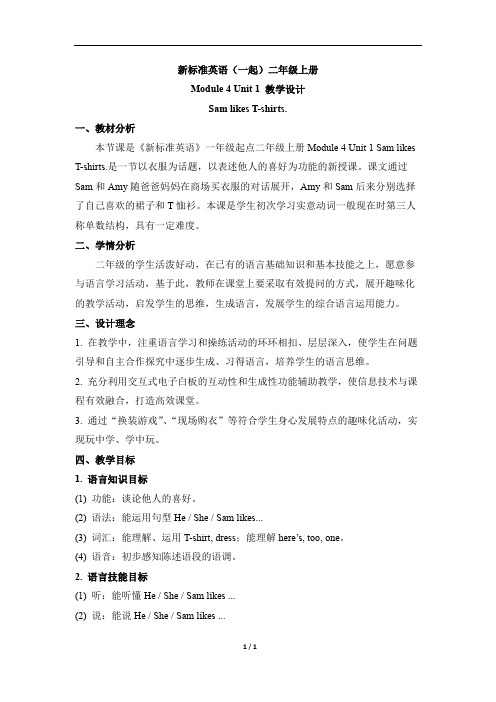
新标准英语(一起)二年级上册Module 4 Unit 1 教学设计Sam likes T-shirts.一、教材分析本节课是《新标准英语》一年级起点二年级上册Module 4 Unit 1 Sam likes T-shirts.是一节以衣服为话题,以表述他人的喜好为功能的新授课。
课文通过Sam和Amy随爸爸妈妈在商场买衣服的对话展开,Amy和Sam后来分别选择了自己喜欢的裙子和T恤衫。
本课是学生初次学习实意动词一般现在时第三人称单数结构,具有一定难度。
二、学情分析二年级的学生活泼好动,在已有的语言基础知识和基本技能之上,愿意参与语言学习活动,基于此,教师在课堂上要采取有效提问的方式,展开趣味化的教学活动,启发学生的思维,生成语言,发展学生的综合语言运用能力。
三、设计理念1. 在教学中,注重语言学习和操练活动的环环相扣、层层深入,使学生在问题引导和自主合作探究中逐步生成、习得语言,培养学生的语言思维。
2. 充分利用交互式电子白板的互动性和生成性功能辅助教学,使信息技术与课程有效融合,打造高效课堂。
3. 通过“换装游戏”、“现场购衣”等符合学生身心发展特点的趣味化活动,实现玩中学、学中玩。
四、教学目标1. 语言知识目标(1) 功能:谈论他人的喜好。
(2) 语法:能运用句型He / She / Sam likes...(3) 词汇:能理解、运用T-shirt, dress;能理解here’s, too, one。
(4) 语音:初步感知陈述语段的语调。
2. 语言技能目标(1) 听:能听懂He / She / Sam likes ...(2) 说:能说He / She / Sam likes ...(3) 读:能认读T-shirt、dress;能朗读课文。
(4) 写:能拼写部分词汇。
3. 情感态度目标能体会到英语学习的乐趣;在小组活动中能与其他同学积极配合和合作;懂得关注他人的喜好。
4. 学习策略在T-shirt、dress等词汇与相应事物之间建立联想;在课堂交流中,注意倾听,积极思考。
Module4 unit1同步练习 2022-2023学年外研版英语八年级上册(含答案)

Module4 unit1同步精练一、单项选择1.The library _________ very early and it _________ after 10:00 p.m.A.opens; closes B.is open; is closed C.opens; is closed D.is open; closes 2.Everybody went to the party _________ Mary. Mary stayed at home and looked after her sister. A.including B.over C.besides D.except3.─When we go traveling,the most comfortable way is by plane.─Yes,and it's also_________.A.the most expensive B.more expensive C.much more expensive D.expensive 4.It takes _________ more than two hours _________ her homework every day.A.she;finishes B.her;finishes C.her;to finish D.she;to finish 5.You can have any of the cakes ________ this one because it is for your mother.A.among B.except C.besides D.without6.I want to write an email to my friend, so I ________ the computer.A.open B.close C.turn off D.turn on7.Mark worked out all the questions in the test paper________the last one. lt was too difficult for him.A.by B.except C.without D.besides8.They live 20 kilometers the school, but they still walk to school everyday. A.away B.far C.far from D.away from 9.The supermarket you like is ________ to your home than before, but now is _________. A.a lot closer; closed B.closely; closed C.more closer; closed D.closer; closes 10.—Where is the bank?—It is ________ the post office ______ the park.A.between, and B.across, from C.next, to D.far, from 11.The boy always wears coat his brother.A.a same;with B.a same;as C.the same;with D.the same;as 12.Does John know any other foreign language _______ French?A.except B.butC.besides D.beside13.I didn’t arrive at the airport ________. I was late again.A.all the time B.on time C.next time D.at any time 14.________ Kangkang, the classroom is empty.A.Besides B.But C.Except D.Except for 15.Why not keep your mouth ________ and your eyes ________ ?A.closing; opening B.close; open C.closed; opening D.closed; open 16.—Who lives ________ school in your class?—Jimmy does. His home is just next to our school.A.close to B.closest to C.far from D.farthest from 17.—________ do you like the movie?—I like it so much ________ its background music.A.What; besides B.How; except for C.Where; except D.Why; but 18.—Liangliang, are you active in class?—Yes, but often I don’t have ________ to show myself in a sixty-student class.A.reasons B.chances C.choices D.abilities19.I was late for school because the bus was too______ for me to get on.A.awful B.fantastic C.crowded D.exciting 20.—The film is, I have to say, not a bit interesting.—Why? It’s ________than the films I have ever seen.A.far more interesting B.much less interestingC.no more interesting D.any less interesting二、完形填空(一)Getting to places can sometimes be difficult, especially (特别)when you are going to a place for the___21___time .In big cities , many people take buses , trains or subways to get from___22___to another .Taking buses is a popular___23___to go somewhere .But you need to know_24_bus to take and where you can get on .You___25___need to be able to read the timetable right ,so you can take the right bus and___26___your place on time .At last, you need to know___27___to get offand___28___the driver the name of the station.In the countryside, transportation can be much simpler.In some places, people get to school or work___29___boat.Some children ride in long boats on the river to get toschool .In____30____places, students walk to school.21.A.first B.second C.third D.fourth 22.A.one place B.the place C.places D.the places 23.A.ways B.way C.answer D.answers 24.A.what B.where C.which D.why25.A.too B.as well C.also D.either 26.A.get to B.arrive C.reach in D.arrive to 27.A.why B.where C.when D.how28.A.say B.talk C.speak D.tell29.A.on B.in C.by D.at30.A.other B.others C.another D.else(二)My holiday is coming. Yesterday I asked my American friends about the best way to travel around the United States. They said it was best to travel by_____31_____ and gave methe_____32_____.To fly,of course,is the fastest way,but one can't see anything during a _____33_____ except the blue sky and white clouds. So it is not very interesting for one who wants to see the_____34_____. Besides,the plane ticket is very. _____35_____.To travel by train is _____36_____,because passengers can walk and buy food and drinks on a train. They can also see cities and the country through the windows. But trains don't leave or_____37_____ at a place every day,and don't go to many cities.To travel by bus is easy, cheap and convenient, though not so fast as travelling by plane or so _____38_____ as by train. You can find buses almost in every city. That makes travel arrangement easy.I take their _____39_____. Now I have decided to go on an interesting _____40_____ by busto the east coast.31.A.bus B.train C.plane D.underground 32.A.reason B.answer C.suggestion D.way 33.A.railway B.flight C.course D.road 34.A.country B.heaven C.cloud D.sky 35.A.cheap B.large C.expensive D.great 36.A.relaxing B.tiring C.boring D.worrying 37.A.reach B.arrive C.pass D.go 38.A.relaxing B.difficult C.tiring D.interested 39.A.advice B.surprise C.feeling D.order 40.A.dialogue B.movement C.trip D.measure三、阅读单选(一)41.If you are at Xizhimen and you want to arrive at Beijing Railway Station in less than (少于) 20 minutes, you will choose ________.A.subway B.bus C.taxi D.bike42.You work for a company in London and you will go to Paris to have a meeting by plane. The cost is ________.A.¥30B.¥100 C.¥60D.¥5443.The most popular way to get to Beijing Railway Station from Xizhimen is by ________. A.bus B.subway C.taxi D.bike。
外研新标准(一起)四年级英语上册同步练习随堂练习一课一练课后作业
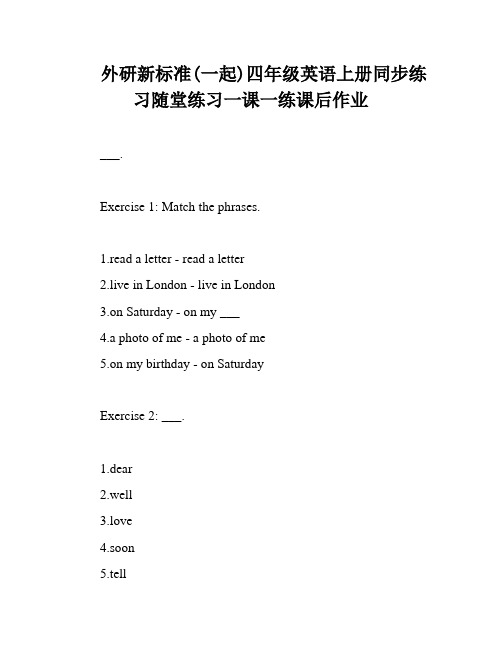
外研新标准(一起)四年级英语上册同步练习随堂练习一课一练课后作业___.Exercise 1: Match the phrases.1.read a letter - read a letter2.live in London - live in London3.on Saturday - on my ___4.a photo of me - a photo of me5.on my birthday - on SaturdayExercise 2: ___.1.dear2.well3.love4.soon5.tellModule 1 Unit 2 I’ve got a new friend.Exercise 1: Complete ___ of the given words.1.It ___.2.Where does she live。
She ___.3.This letter is from Lucy.4.She has got a new friend.5.Children from China are Chinese.Exercise 2: ___.1.___.2.___。
___.3.I usually ___.st night。
___.5.Mr。
Smith lives in New York。
but we live in Beijing. Module 1 Unit 2: I’ve Got a New Friend。
Exercise 2Spelling Words:1.read2.___3.live4.___5.___6.pictureModule 2 Unit 1: I Helped My Mum。
Exercise 1Magic ___:Find ___.1.___2.dirty3.finish4.wash5.cleanTry to Write:___.1.She made her bed ___.2.___.3.___.4.___.___:1.___。
新 外研七下练习Module4 Unit1 单元测试带答案和解析

外研版七年级下册Module4 Life in the futureUnit1 Everyone will study at home.一、根据音标写出单词和汉语1.[tʃɔːk]n.2.['ruːlə]n.3.['kærɪ]v.4.[tʃeɪn(d)ʒ]v.&n.5.['evrɪθɪŋ]pron.6.['fjuːtʃə]n.7.[laɪf]n.8.[niːd]v.&v.aux.9.[wɪl]v.aux.(would) 10.['meɪbiː;-bɪ]adv.11.[ɑːsk]v.12.['kwestʃ(ə)n]n.13.[baɪ]prep.14.['lev(ə)l]n.15.['eɪb(ə)l]adj.16.beableto17.[mɔː]adv.二、划线音标归类1.Ruler2. future3. student4. use5. blue6.But7. fun8. study9. us 10. put 11.c halk 12 would 13. everything 14. thank 15.father1.将来2.不再3.在二十年以后4.在互联网上5.在家学习6.使用电脑去做某事7.通过电脑,互联网或者电话8.获取信息9.检查学生的学习水平10.在黑板上11.有很多作业12.空闲时间13.回答学生们的问题14.需要做某事15.一块粉笔16.携带书籍去学校四、句型考查1.二十年后,也许没有学校了!______ ______ ______ _______, maybe there ________ ________ ______schools! 2.他们可以通过网络、电话或电子邮件问老师问题。
They can ask their teachers questions ________ ________,telephone or email. 3.哦,我不确定。
MK_外研版小学英语四年级上册Module4Unit1精讲精练
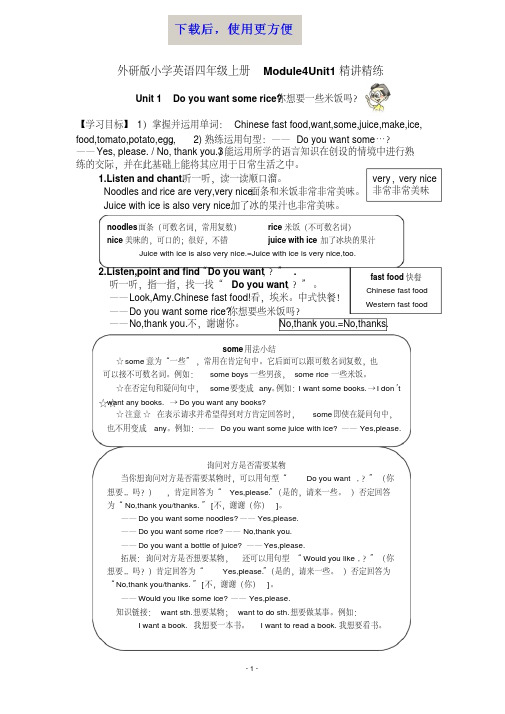
外研版小学英语四年级上册Module4Unit1精讲精练Unit 1 Do you want some rice?你想要一些米饭吗?【学习目标】1)掌握并运用单词:Chinese fast food,want,some,juice,make,ice, food,tomato,potato,egg ,, 2) 熟练运用句型:——Do you want some …?——Yes, please. / No, thank you.3)能运用所学的语言知识在创设的情境中进行熟练的交际,并在此基础上能将其应用于日常生活之中。
1.Listen and chant.听一听,读一读顺口溜。
Noodles and rice are very,very nice.面条和米饭非常非常美味。
Juice with ice is also very nice.加了冰的果汁也非常美味。
2.Listen,point and find “Do you want ,?”. 听一听,指一指,找一找“Do you want ,?”。
——Look,Amy.Chinese fast food!看,埃米。
中式快餐!——Do you want some rice?你想要些米饭吗?——No,thank you.不,谢谢你。
No,thank you.=No,thanks.☆☆noodles 面条(可数名词,常用复数)rice 米饭(不可数名词)nice 美味的,可口的;很好,不错juice with ice 加了冰块的果汁Juice with ice is also very nice.=Juice with ice is very nice,too.very ,very nice 非常非常美味fast food 快餐Chinese fast food Western fast food some 用法小结☆some 意为“一些”,常用在肯定句中。
五年级上册英语教案Module4第1课时Unit1MumboughtanewT-shirtforme

五年级上册英语教案Module4 第1课时 Unit 1 Mum bought a new Tshirt for me. Activities 12 外研版(三起)教学内容本课时为Module4的第1课时,教学内容为Unit 1 "Mum boughta new Tshirt for me",主要围绕购物主题展开,学习如何描述购物经历和衣物的外观。
通过Activities 12的学习,学生将能够理解和运用相关的英语表达方式。
教学目标1. 知识与技能:学生能够理解并运用本课时的核心句型,如"Mum bought a new Tshirt for me",并能描述衣物的颜色、大小等特征。
2. 过程与方法:通过参与课堂活动,学生将提高听说能力和合作学习能力。
3. 情感态度与价值观:培养学生对购物的兴趣,增强他们对英语学习的自信心。
教学难点1. 句型掌握:正确使用过去时态描述购物经历。
2. 词汇运用:学生能够准确地使用衣物相关的形容词,如"big"、"small"、"red"等。
教具学具准备1. 多媒体设备:用于播放PPT和音频材料。
2. 图片卡片:展示衣物图片,帮助学生练习描述。
3. 角色扮演道具:模拟购物场景,增强学生的实际应用能力。
教学过程1. 导入:通过展示一些衣物的图片,引导学生回顾和讨论以前学过的相关词汇。
2. 新课内容学习:讲解并练习新的句型和词汇,通过听录音、模仿和角色扮演等方式加强理解和记忆。
3. 合作学习:学生分组,进行购物场景的角色扮演,使用本课时的句型和词汇。
4. 巩固练习:完成练习册上的相关练习,教师提供即时反馈。
板书设计板书将清晰地展示本课时的核心句型、重要词汇和语法点。
通过颜色和图示的辅助,帮助学生更好地理解和记忆。
作业设计1. 书面作业:完成练习册上的相关练习题。
2. 口头作业:学生在家中与家长进行角色扮演练习,模拟购物场景。
外研版-英语-九上-九上Module4 1单元 教案
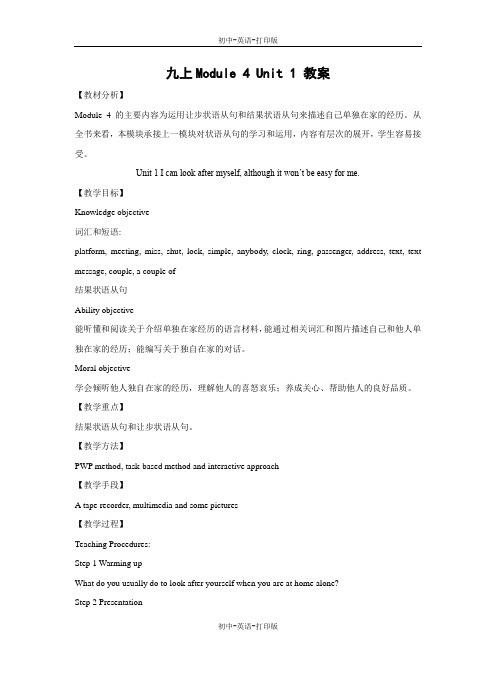
九上Module 4 Unit 1 教案【教材分析】Module 4的主要内容为运用让步状语从句和结果状语从句来描述自己单独在家的经历。
从全书来看,本模块承接上一模块对状语从句的学习和运用,内容有层次的展开,学生容易接受。
Unit 1 I can look after myself, although it won’t be easy for me.【教学目标】Knowledge objective词汇和短语:platform, meeting, miss, shut, lock, simple, anybody, clock, ring, passenger, address, text, text message, couple, a couple of结果状语从句Ability objective能听懂和阅读关于介绍单独在家经历的语言材料,能通过相关词汇和图片描述自己和他人单独在家的经历;能编写关于独自在家的对话。
Moral objective学会倾听他人独自在家的经历,理解他人的喜怒哀乐;养成关心、帮助他人的良好品质。
【教学重点】结果状语从句和让步状语从句。
【教学方法】PWP method, task-based method and interactive approach【教学手段】A tape recorder, multimedia and some pictures【教学过程】Teaching Procedures:Step 1 Warming upWhat do you usually do to look after yourself when you are at home alone?Step 2 PresentationThe teachers shows the pictures of new words or expressions and let the students to say as quickly as possible.Step 3 Work in pairs. Talk about the pictureLook at the picture and talk about what they will do in pairs.Step 4 Listening1. Listen to Part 2 and answer the questions.1) Where are Betty and her parents?2) Is Betty travelling with her parents?2. Finish Activity3. Listen again and complete the sentences.Step 5 Reading1. Listen and answer the following questions.1) Who is leaving for Lhasa?2) How do they go there?2. Read and complete the sentences. There may be more than one answer.1) Betty’s parents are going to ______.2) Her parents tell her to _______________.3) Betty can __________.4) Betty’s parents usually __________.5) Betty’s mum has not _____________.3. Act out the dialogue in groups according to the following words.Mum: train number, meeting, the door, plenty of fresh fruit and vegetables, give ouraddressDad: wake upBetty: two weeks of school, look after myself, cook simple meals, text messageStep 6 Language points1. So am I, but I can’t miss two weeks of school.So am I承接上一句贝蒂妈妈说的话: … I’m sorry you can’t come with us, Betty. (贝蒂, 你不能和我们一起去, 很遗憾), 表示“我也很遗憾无法同行”。
Module4_词句精讲精练
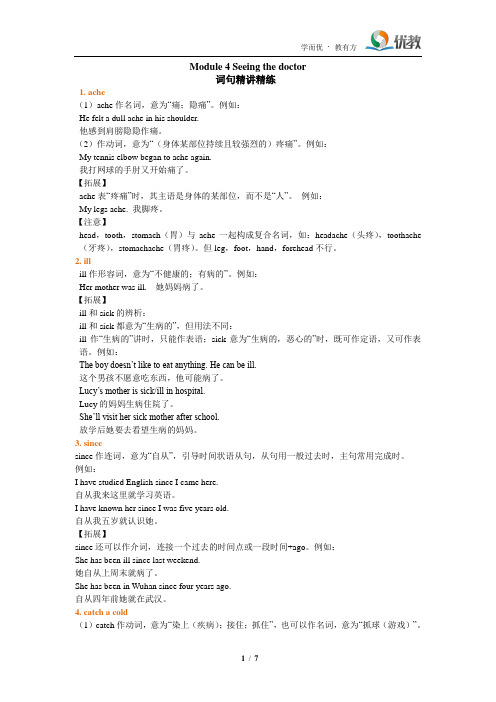
Module 4 Seeing the doctor词句精讲精练1. ache(1)ache作名词,意为“痛;隐痛”。
例如:He felt a dull ache in his shoulder.他感到肩膀隐隐作痛。
(2)作动词,意为“(身体某部位持续且较强烈的)疼痛”。
例如:My tennis elbow began to ache again.我打网球的手肘又开始痛了。
【拓展】ache表“疼痛”时,其主语是身体的某部位,而不是“人”。
例如:My legs ache. 我脚疼。
【注意】head,tooth,stomach(胃)与ache一起构成复合名词,如:headache(头疼),toothache (牙疼),stomachache(胃疼)。
但leg,foot,hand,forehead不行。
2. illill作形容词,意为“不健康的;有病的”。
例如:Her mother was ill.她妈妈病了。
【拓展】ill和sick的辨析:ill和sick都意为“生病的”,但用法不同:ill作“生病的”讲时,只能作表语;sick意为“生病的,恶心的”时,既可作定语,又可作表语。
例如:The boy doesn’t like to eat anything. He can be ill.这个男孩不愿意吃东西,他可能病了。
Lucy’s mother is sick/ill in hospital.Lucy的妈妈生病住院了。
She’ll visit her sick mother after school.放学后她要去看望生病的妈妈。
3. sincesince作连词,意为“自从”,引导时间状语从句,从句用一般过去时,主句常用完成时。
例如:I have studied English since I came here.自从我来这里就学习英语。
I have known her since I was five years old.自从我五岁就认识她。
英语外研版必修1 Module4《A Social Survey—My Neighbourhood》教案 1st period

Module 4 A Social Survey-My NeighbourhoodⅠ.The General Idea of This ModuleThe tasks of Module 4 are about how to get to know and introduce some places.Through oral practice,enable the students to introduce what they see and what they hear and describe them in writing.INTRODUCTIONLearn and master some words and phrases about buildings and living places.In order to preparefor the activities later,the task is to get the students to understand the words and phrases.READING AND VOCABULARYThrough the dialogue,the geography place of Xiamen is introduced,including its climate and a survey of the city of Xiamen.Enable the students to grasp the words and use them to describe their living places.GRAMMAR 1Learn how to use the perfect present tense:The actions happened in the past,but theeffects or results still remain now.LISTENING AND VOCABULARYPractice using the words and phrases,train the students’ listening ability and test the results of listening.GRAMMAR 2The importance of Grammar 2 is about the differences between continuous verbs and discontinuous verbs and how to use them in the Present Perfect Tense.First make sure the students clear what is a continuous verb and what is not a continuous verb. Fox example,He has come here.He has been here for two hours.Here“come” is not a continuous ver b. But “be” is a continuous ver b.PRONUNCIATIONThis part is to improve the students’pronunciation.Stress is important in speaking English.The students should master Parts of Speech.Generally speaking,the National Parts have stress in a sentence.But the Structural Parts don’t have.WRITINGThrough observing and writing,make sure that the students can use the words and and but.EVERYDAY ENGLISHIn the part the students practice using seven pieces of everyday English.During teaching, practice using them in conscious or unconscious.FUNCTION AND SPEAKINGThe students should learn and master how to introduce directions and places in English in this part.CULTURAL CORNERIncrease the students’ interests to know something about the life in western countries.TASKSThrough the practice of dialogue and reading,the students should be able to master some useful words and expressions about describing buildings and surroundings.In order to cultivate the students’ability of collecting and dealing with information,and develop theirabilities in getting new information,communication and cooperation,the tasks are about a survey of their living situation and they are also asked to write a report in English.Ⅱ.Three-Dimensional Goals1.Knowledge and Skills:2.Through introducing some places, develop the students’abilities to take active part in different activities. Train the ability of collecting and dealing with information, and develop their abilities of getting new information, communication and cooperation.3. Process and MethodsFirst lead the students to make dialogues about different buildings and facilities. Then ask the students to survey their living places and write down what they see and hear to improve the students’ speaking and writing abilities.4. Emotion, Attitude and V alue in TeachingLet students know the society, develop the students to care for the people around them andthe society. Cultivate their ability of studying and solving questions.Ⅲ.Teaching Important PointsIn this module, through practicing listening, speaking and reading, the students will be able to get to know and introduce some places. Educate the students’ cultural awareness and enable them to love our hometown and our homeland.Ⅳ.Teaching Difficult PointsHow to teach the Present Perfect Tense during teaching process.Ⅴ.Teaching Aidsmultimedia, a TV set or a recorderⅥ.Teaching TimeSeven periodsThe First Period: Introduction: V ocabulary and SpeakingThe Second and Third Period: Reading and V ocabularyThe Fourth Period: Grammar 1, Listening and V ocabularyThe Fifth Period: Pronunciation, Grammar 2 and WritingThe Sixth Period: Everyday English, Function and SpeakingThe Seventh Period: Cultural Corner, Task and Module and Workbook ExercisesThe First PeriodThe General Idea of This PeriodThe students will be able to learn some new words and phrases. And try to use them to describe buildings.Teaching Aims1. The students will be able to learn and master the following words and phrases:flat apartment block countryside five-storey high-rise building local mile floor suburb stone survey be similar to live with sb. / sth neighbourhood2. Improve the students’ speaking’ ability.3. Learn to describe some buildings and places.Teaching Important Points1. Master the new words and phrases.2. How to use “and” and “but”.3. Enable the students to write a brief report of their neighbourhood.Teaching Difficult Points1. How to use “and” and “but”.2. How to improve the students’ writing ability.Teaching Methods1. Asking and answering activity to help the students go through the reading materials.2. Individual, pair or group work to make every student work in class.Teaching ProceduresStep 1 Greetings and lead inT: Good morning, boys and girls.S: Good morning, teacher.T: Sit down please. Boys and girls, let’s see two pictures.(Show the pictures)T: Please tell me something about the pictures?S: One is about the buildings in cities. The other is the countryside.T: Yeah. Which one is more beautiful? Why?S: I think the right one is. It is modern.T: How many floors do you guess the big one has?S: I guess it’s about 80.T: Do you agree?S: No. I think it’s about 30.T: If possible, which floor do you want to live in?S: The top one.T: The top one? Why?S: Live there, I can see the whole city.T: Try. I think you can one day.Step 2 PresentationNow let’s look at these words.(Show)1. Get one to read the words. Check his or her pronunciation and stress.2. Get the students to pay attention to the new words.(1) survey n.The group made a survey of the life in the countryside.The experts made a survey of the site of the prospective steel works.The report gives a survey of growth of the chemical industry.The market __________shows the new products have good potential if they are welldeveloped.A. madeB. supportC. surveyD. examine答案:C。
Moudle4 Unit1period1(练习及解析)_外研社(三起)四年级英语下-经典教学教辅文档

【精品】四年级下英语(练习)Module4 Unit1-Period1外研社三起点(2019秋)一.翻译以下单词或者短语。
1.take_________2.Saturday _________3.fly _________4.Friday________5.kite_________6.picnic _________7.because _________8.great__________9.why_________ 10.why not_________答案:1.带走2.周六3.飞4.周五5.风筝6.野餐7.由于8.好极了9.为甚么10.为甚么不二.给方框里面的短语选择正确的译文。
( )2.on Saturday( )3.on Friday( )4.take my kite( )5.have a picnic( )6.why not答案:1.E2.D3.A4.C5.B6.F三.读一读,排一排。
( )Because tomorrow is Friday.( )Why not?( )No,I won't.( )Yes!So I will take my kite and my ball on Saturday.( )Oh!We're going to have a picnic on Saturday.( )Will you take your kite and ball tomorrow?答案:432651解析:做排序题,需求了解每一句话的意思,掌握对话次要内容,然后在根据上下句排序,排序后在通读对话,看看能否正确。
( 4)Because tomorrow is Friday. 翻译:由于明天是周五。
( 3 )Why not? 翻译:为甚么不?( 2 )No,I won't. 翻译:不,我将不。
( 6 )Yes!So I will take my kite and my ball on Saturday.翻译:是的,因而周六我将带上我的风筝和球。
module4 unit1

《module4 unit1》教案设计一、教案背景1.面向学生:□中学2.学科:英语外研社六年级上学期3.课时:14.学生课前准备:(1)预习课文,了解故事大意。
(2)通过百度搜索引擎【】查找与本课相关的资料。
二、教学课题本节课是外研社(供一年级起使用)第十一册第四模块中的内容。
主要围绕“festivals”这一主题展开各种教学活动,并以这一主题引出现在进行时的一般疑问句,否定句以及特殊疑问句等语言功能。
本单元旨在创造一个轻松、愉快的学习、交流环境,通过听、说、读、写来培养学生综合运用这些知识的能力。
并让学生能在“做中学”(learning by doing),通过有限的课堂实践活动,注意观察别人的行动,能准确地用英语来表达。
学习本课需要达成以下的目标:1. Knowledge: learn the new words: special, hear, nearly, present, together and learn the new sentences: Can you tell me about America festival? Yes, Thankgiving is my favourite . Families are together.We have a big special dinner.2. Ability: Students can describe other festivals.3. Moral: Love china.三、教材分析这节课的学习的重点是让学生能够对节日的谈论,掌握人称代词(主格,宾格)和物主代词。
“Can you tell me about…?”及主系表结构“… is my favourite festival.”。
在这一模块中,让学生学习,了解不同的中外节日。
谈论在不同的节日人们做什么,吃什么,看什么等等。
教学重点为词汇、词组搭配和特殊疑问句的用法及回答。
Module4Unit1单词句子知识详解22-23外研版九年级英语上册

单项选择
二、根据句意及汉语提示填写单词
1. Look! Several _____(对) are dancing on the floor.2. Amanda, _____ (锁) the door, please.3.I can cook the _____ (最简单的)meals in my family.4. Luckily, none of the _____ (乘客) got hurt in the bus accident. 5. Do you like ___ (室外) activities?
6 My clock rings so loudly that it will certainly wake me up. 我的闹钟铃声那么大,它一定会叫醒我的。
【要点】 ring动词,意为“鸣响;发出铃声”,过去式为rang。ring 还可意为“....打电话”, ring up意为“打电话”。【例】As soon as he got home , the phone rang. 他一回到家,电话就响了。【助记】ring
PART Two
单子句子知识详解
1 So am I, but I can't miss two weeks of school. 我也是(很遗憾),但是我不能两周不上课。
【要点】“So+连系动词be/助动词/情态动词+主语.”为倒装结构,表示前面所述的某一肯定情况也同样适用于本句主语, 意为....也一样”。 当表示前面所述的某一否定情况也同样适用于另一主语时,则用“Neither/Nor+连系动词be/助动词/情态动词+主语.”,意为..也不”。【提醒】在两种倒装结构中,连系动词be、助动词或情态动词在时态上要与前面句子中的谓语动词保持一致,在数上要与本倒装句的主语保持一致
- 1、下载文档前请自行甄别文档内容的完整性,平台不提供额外的编辑、内容补充、找答案等附加服务。
- 2、"仅部分预览"的文档,不可在线预览部分如存在完整性等问题,可反馈申请退款(可完整预览的文档不适用该条件!)。
- 3、如文档侵犯您的权益,请联系客服反馈,我们会尽快为您处理(人工客服工作时间:9:00-18:30)。
Exercises for Unit1 Module4 (1)一.单词应用根据单词的首字母或汉语意思填写正确单词,注意形式变化.1.If you want to sell this product well, I advise you to a_________ it in the newspaper oron TV.2.All of us finally agreed to his plan because of his p_______ language.3.Nearly all the a_______ to the palace were guarded by the soldiers.4.The writer traveled throughout the country to p_________ his latest novel.5.PSAs are often placed for free, and are i______ to educate people about health, safety,or any other i_______ which affects public welfare.6.China has strong laws to protect people from advertisements that lie or try to makepeople believe u_______ claims about products or services.7.The advertisers want you to read the word …fights‟ and think that the toothpaste c______bad breath, but it does not say that!8.PSAs use some of the same methods, like attractive and original images and c_____language, but they are made to serve the public.9.China began a nationwide public service advertising c______ in 1996, and since thennumerous PSAs have appeared around the country.10.One of the PSAs to teach us how to live healthy lives is …Smoking is _____________(自杀) slowly‟.二.词形转换1. intended ( adj.) ---- _______ ( n .)2. educate ( v. ) ---- __________ ( n. )3. connect ( v. ) ----________ ( n. )4. advertiser ( n. )----__________ ( n. )5. create ( v. ) ---- _________ (adj.)6. society ( n. ) ---- __________ ( adj.)7. imagine ( v.)----__________( n.) 8. determine (v.)----__________( adj.)9. complete (adj./v.)---_________(adv.) 10.satisfied (adj.)_______(v.)______ (n.)三.单项选择1.We won‟t think any of his remarks no matter how __________ the y turn out to be.A.persuadingB. persuadedC. persuasiveD. persuade2.I ________ to go out for a walk but the ________ decision was canceled(取消) because of the rain.A. intend; intendingB. intended; intendedC. intending; intendedD. was to intend; intending3. The little rabbit __________ of the danger and disappeared in the bush.A. be awareB. was awareC. aware ofD. aware4. He does __________ help and ________ no harm.A. mean to; meansB. meant; meanC. mean to; meaningD. to mean; meant5. In modern society, the more _______ you own, the more _____ you shall get every day.A. knowledges; informationsB. knowledge; informationC. knowledges; informationD.knowledge; informations6. with a difficult situation, Arnold decided to ask his boss for advice.A. To faceB. Having facedC. FacedD. Facing7. I really can't understand ______ her like that.A. you treatB. you to treatC. why treatD. you treating8. It‟s necessary to be prepared for a job interview. ______ the answers ready will be of great help.A. To have hadB. having hadC. HaveD. Having.9. I couldn‟t do my homework with all that noise ________.A. going onB. goes onC. went onD. to go on10. When help, one often says “Thank you.” or “It‟s kind of you.”A.offering B.to offer C.to be offered D.offered11. ----$500, but that is my last offer. ----OK, it is a _________.A. costB. priceC. rewardD. deal12. They tricked the pretty girl _________stealing money from the store.A. intoB. toC. withD. against13. Nick is looking for another job because he feels that nothing he does ________his boss.A. servesB. satisfiedC. promisesD. supports14. Your suggestion is _______to us.A. of very valueB. great valuableC. of great valueD. very value15. Can you tell me __________________________?A. what life will be like in the futureB. what will life be like in the futureC. how life will be like in the futureD. how will life be like in the future16. A ____ customer is _____ who has no complaints.A. satisfied; somebodyB. satisfying; thatC. satisfy; whichD. satisfied; one17. The performance of the host, ____ to please the audience and draw their attention,was greeted with a cold silence, however.A. had intendedB. intendedC. intendingD. to intend18. I‟m not used to _____ like that.A. be spoken toB. speaking toC. being spoken toD. spoke to19. Who ____ look after the room?A. are supposed toB. are supposedC. is supposed toD. is supposed20. All the employees except the manager ________ to work online at home.A. encouragesB. encourageC. is encouragedD. are encouraged四.完形填空After the birth of my second child, I got a job at a restaurant. Having worked with an experienced 36 for a few days, I was 37 to wait tables on my own. All went38 that first week. When Saturday night came, I was luckily 39 the tables not far from the kitchen 40 ,I still felt it a little hard to carry the heavy trays (托盘).Before I knew it, the 41 was full of people, I moved slowly 42 , every step. I remember how 43 I was when I saw the tray stand net the tables, it looked different from the one I was 44 on, It had nice handles(手柄),which made it 45 to move around. I was pleased with everything and began to 46 I was a natural at this job.Then, an old man came to me and said,“Excuse me, dear, my wife and I loved 47 you work . It seems your tray stand has been very 48 to you, but we are getting ready to 49 now , and my wife needs her 50 back.”At first his 51 did not get across. “What was he talking about!” Then, I got it. I had set my trays on his wife‟s orthopedic walker(助步器),I stood frozen as ice, but my face was 52I wanted to get into a hole and 53 .Since then, I have leaned from many mistakes such as the one I just 54 .I have learned to be more 55 and not to be too sure of myself.36.A. manager B. assistant C. cook D. waitress37.A. promised B. invited C. allowed D. advised38.A. well B. quickly C. safety D. wrong39.A. left B. given C. brought D. shown40.A. Therefore B. However C. Otherwise D. Finally41.A. kitchen B. street C. restaurant D. table42.A. minding B. changing C. taking D. saving43.A. angry B. calm C. sad D. happy44.A. fixed B. trained C. loaded D. waited45.A. slower B. lighter C. quieter D. easier46.A. believe B. agree C. regret D. pretend47.A. letting B. making C. watching D. having48.A. useful B. familiar C. unusual D. interesting49.A. rest B. order C. eat D. leave50.A. bag B. walker C. tray D. coat51.A. idea B. praise C. message D. need52.A. cold B. full of joy C. pale D. on fire53.A. lie B. hide C. defend D. stay54.A. repeated B. discovered C. corrected D. described55.A. careful B. patient C. honest D. practical五. 阅读理解Last week my youngest son and I visited my father at his new home in Tucson, Arizona. He moved there a few years ago, and I was eager to see his now place and meet his friends.My earliest memories of my father are of a tall, handsome, successful man devoted to his work and family but uncomfortable with his children. As a child I loved him; as a school girl and young adult(成年人)I feared him and felt bitter about him He seemed unhappy with me unless I got straight A‟s and unhappy with my boy friends if their fathers were not as “successful”as he was. Whenever I went out with him on weekends, I used to struggle to think up things to say, feeling on guard.On the first day of my visit, we went out with one of my father‟s friends for lunch at an outdoor cafe. We walked along that afternoon, did some shopping, ateach the street table, and laughed over my son‟s funny facial expressions Gone was my father‟s critical(挑剔的)air and strict rules. Who was this person I knew as my father, who seemed so friendly and interesting to be around? What had held him back before?The next day my dad pulled out his childhood pictures and told me quite a few stories about his own childhood. Although our times together became easier over the years, I never felt closet to him at that moment. After so many years, I‟m at last seeing another side of my father. And in so doing, I‟m delighted with my new friend. My dad in his new home in Arizona is back to mc from where he was.56.Why did the author feel bitter about her father as a young adult?A. He was silent most of the timeB. He was too proud of himselfC. He did not love his childrenD. He expected too much of her57.When the author went out with her father on weekends, she would feel .A. nervousB. sorryC. tiredD. safe58.What does the author think of her father after her visit to Tucson?A. More criticalB. More talkativeC. Gentle and friendlyD. Strict and hard-working59.The underlined words“my new friend”in the last paragraph refer to .A. the author‟s sonB. the author‟s fatherC. the friend of the author‟s fatherD. the cafe owner。
